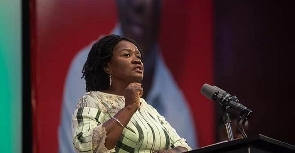The next National Democratic Congress (NDC) government will institute a four-month maternity leave system for Ghanaian workers, Professor Naana Jane Opoku-Agyemang, vice-presidential candidate of the NDC, has said.
The move, she explained, is to provide enough time for working mothers to recover fully after childbirth, have enough time to take care of their new-borns, and organise themselves before returning to work.
“Giving four months of maternity leave to women is in order,” the running mate stated.
She said this while interacting with professional bodies and unions at Bolgatanga as part of her campaign tour of the Upper East Region, according to a statement signed by Mawuena Trebah, spokesperson of the running mate, and copied to the Ghana News Agency in Accra.
Providing glimpses of the policy interventions in the soon-to-be launched NDC manifesto, she said the increase in the maternity leave period was in response to research-based concerns, which indicated that the three months provided to mothers was insufficient.
Section 57(1) of Ghana’s Labour Act 2003, Act 651 stipulates that “A woman worker,
on production of a medical certificate issued by a medical practitioner or a midwife indicating the expected date of her confinement, is entitled to a period of maternity leave of at least twelve weeks in addition to any period of annual leave she is entitled after her period of confinement".
Although the labour law does not limit the leave period to 12 weeks (three months), the three-month period has become the general practice in Ghana.
But taking into consideration the need for lactating mothers to return to work in good health to perform productively, Prof Opoku-Agyemang said the NDC would make it a mandatory four- month maternity leave period.
“Our manifesto is of a different nature this time,” she said, adding that there were innovative policies that would enable the NDC government to build on its enviable achievements and do more for workers.
She said the new policy programmes in the manifesto, designed to enable Ghanaians to achieve their aspirations, had incorporated the views of the various workers’ unions and professional groups, as a measure to ensure all-inclusive governance.
“We need to work together by listening to each other. We need to be non-discriminatory; we need to plan together,” she said.
Politics of Thursday, 20 August 2020
Source: GNA

















